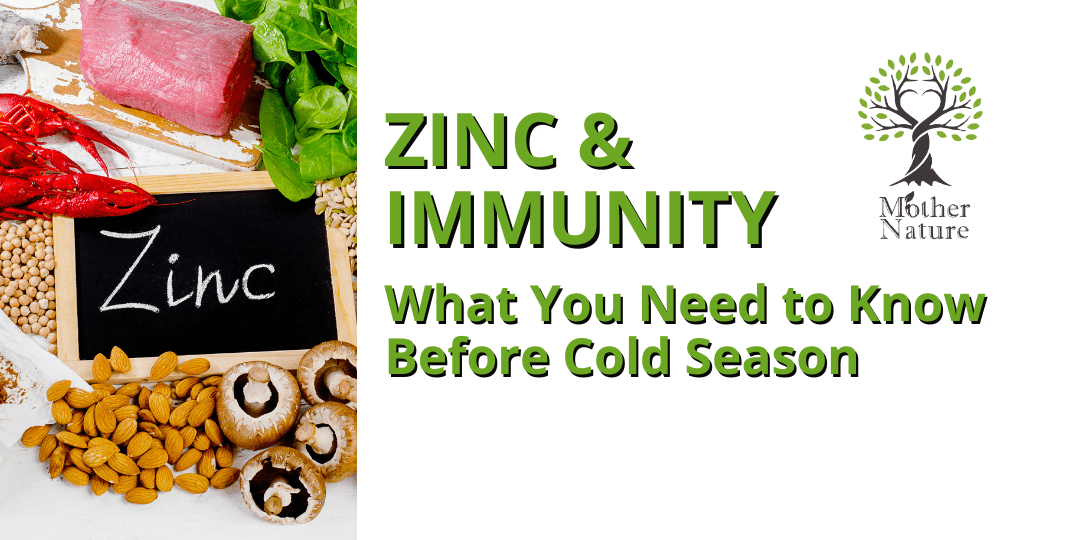Zinc & Immunity: What You Need to Know Before Cold Season

As the days get shorter and temperatures drop, people often face an increase in colds and viruses. Enhancing your immune system during these months can make a big difference in staying healthy, and zinc is one mineral that plays a vital role. Below, we'll explore how zinc influences immunity and what you should know to prepare for the cold season.
Understanding the Role of Zinc in the Immune System
Zinc is an essential trace mineral found in every cell of the body. It is involved in numerous aspects of cellular metabolism, but its impact on the immune system is particularly significant. Here’s how zinc contributes to immune function:
-
Immune Cell Function: Zinc is crucial for the development and functioning of immune cells such as neutrophils and natural killer cells. It supports the immune system’s ability to fend off invading pathogens.
-
Antioxidant Defense: As an antioxidant, zinc helps combat oxidative stress, which can weaken immune defenses. By reducing oxidative damage, zinc allows the immune system to operate more efficiently.
-
Enzymatic Activity: Zinc is a cofactor for over 300 enzymes in the human body, including those involved in DNA synthesis and cell division. These processes are vital for maintaining a robust immune response.
How Zinc Affects Cold and Flu Symptoms
Scientific evidence suggests that zinc can be particularly beneficial in reducing the severity and duration of the common cold. Studies have shown that taking zinc supplements within 24 hours of the onset of symptoms can lessen their intensity and length. Here's why:
-
Reduction in Symptom Duration: Zinc may inhibit the replication of cold viruses, thereby shortening the duration of the illness.
-
Symptom Relief: Though not a cure, zinc can alleviate specific symptoms, such as sore throat and congestion, by decreasing inflammation and soothing irritated tissues.
Recommended Zinc Intake and Sources
Dietary Recommendations
For adults, the recommended dietary allowance (RDA) for zinc is about 8 mg per day for women and 11 mg per day for men, though this can vary based on age and physiological status, such as pregnancy. It's best to consult with a healthcare provider to determine personal needs, especially before starting any supplementation.
Natural Sources of Zinc
Incorporating zinc-rich foods into your diet is a natural way to bolster your intake. Some excellent sources include:
-
Oysters: One of the richest sources of zinc.
-
Red Meat and Poultry: Provide a significant amount of zinc readily absorbed by the body.
-
Beans and Nuts: Offer plant-based zinc, though it is less bioavailable compared to animal sources.
-
Whole Grains and Dairy Products: Contribute moderate amounts.
Should You Consider Zinc Supplements?
While obtaining zinc from food is ideal, supplements are sometimes necessary, especially for individuals with dietary restrictions or specific health concerns. Zinc lozenges or tablets are popular during cold season. However, it is essential to take these supplements as directed, as excessive zinc intake can interfere with copper absorption and cause adverse effects.
Conclusion
As you gear up for the cold season, fortifying your immune system with zinc could be a proactive step in maintaining your health. Whether through diet or supplements, ensuring adequate zinc intake can contribute to a more resilient immune system and potentially lessen cold symptoms. Always seek professional advice when considering supplements to ensure they align with your health needs. With the right preparation, you can better protect yourself during the months when colds are most prevalent.
The common cold is a frequent concern, particularly during the flu season, where cold symptoms such as a scratchy throat, nasal congestion, and abdominal cramps are prevalent. Despite its ubiquity, maintaining optimal immune function is crucial for overcoming respiratory tract infections quickly and efficiently. One way to support immune health is through the intake of essential minerals, including zinc, a trace element that plays critical roles in human health.
Zinc deficiency can increase the risk of infections, especially viral infections like the common cold and bacterial infections affecting the respiratory system. To mitigate this, zinc supplementation has been researched for its potential to decrease the severity of symptoms and reduce the cold duration. Forms of zinc such as zinc gluconate lozenges, zinc acetate, and zinc citrate are often recommended as cold remedies. A systematic review and meta-analysis have shown that zinc for colds, particularly in forms like zinc gluconate, can help shorten the duration and lessen cold symptoms.
However, the effectiveness of zinc absorption can vary, with certain populations, such as adult women, pregnant women, and individuals with chronic diseases like kidney disease and coeliac disease, being at greater risk of zinc deficiency. Zinc status is vital as deficiencies can impair both cellular and adaptive immunity, increasing susceptibility to infectious diseases.
For healthy adults, incorporating a balanced diet with sufficient food sources of zinc is vital. Plant-based foods can also provide zinc, though the bioavailability from plant-based sources may be lower than that from animal products. Therefore, a varied diet including both animal sources, such as meat and dairy, and plant foods like nuts and seeds, can help maintain adequate zinc levels.
Zinc nasal sprays and intranasal zinc have been used to combat upper respiratory tract infections, although care must be taken due to potential side effects such as altered senses of taste or upset stomach. It's important to adhere to the upper limit recommendations by the Office of Dietary Supplements to avoid adverse effects like an upset stomach or abdominal cramps from excessive zinc intake.
In addition to zinc, Vitamin C is often cited for reducing the risk and duration of colds. Together, these nutrients support the immune system, contributing to a healthier response during cold seasons.
Overall, maintaining a balanced intake of essential minerals like zinc, alongside other nutrients, can strengthen immune defenses and reduce the impact of cold symptoms during the flu season, supporting overall health and wellness.






